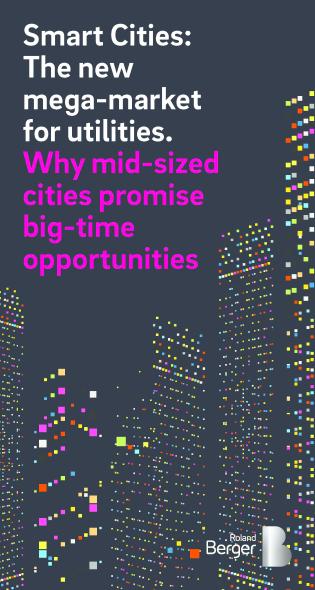Smart Cities: A big opportunity for utilities
![{[downloads[language].preview]}](https://www.rolandberger.com/publications/publication_image/smart_city_flyer_2019_en_1_cover_image_download_preview.jpg)
Smart City solutions are at the top of the agenda in many mid-sized EU cities – and utilities can contribute positively to a Smart City competence center.


“Smart City” solutions are at the top of the agenda in many mid-sized European cities, but only 20 percent of decision-makers have a strategy – and need external help. All this is revealed in our study “Smart Cities: The new mega-market for utilities. Why mid-sized cities promise big-time opportunities”.
For this study, decision-makers and experts from 50 mid-sized cities in 13 European countries were interviewed, including Western Europe, Central and Eastern Europe, and the DACH region. The result is a comprehensive picture enabling Roland Berger to compare different regions – and describe the opportunities for utilities in detail.
"Mid-sized cities need utilities and other companies as strong partners to help them develop Smart City strategies and implement them."
In the EU, mid-sized cities – defined as urban areas with 100,000 to 500,000 inhabitants – host one third of the EU population living in cities with more than 50,000 residents. Just like big cities they are economic powerhouses, logistic hubs, administrative centers, drivers of innovation, forerunners of trends, and attractive destinations for talent. It is hardly surprising, therefore, that these cities are becoming increasingly interested in the Smart City concept.
According to the poll, 81 percent of respondents consider a Smart City strategy as a medium, high or high strategic priority. However, medium-sized cities have so far mostly only relied on pilot projects that are hardly networked with each other and therefore have little impact. After all, only around 20 percent of local authorities have a Smart City strategy that has been used to plan and manage projects in a targeted manner. So as not to lose touch, mid-sized cities seem to need strong network partners and stakeholders to help them develop strategies and implement them.
As our study shows, utilities could take on this role, especially those that are at home in medium-sized cities. They give high priority to the topic – they want to allocate around 14 percent of their investment budget to Smart City applications – and have the know-how and resources to plan and implement intelligent solutions in the areas of energy supply, mobility, housing and municipal services. There are more than 280 medium-sized cities in Europe – and thus more than 280 potential large and long-term customers for utilities.
The term “Smart City” has been used since the 2000s by various players in politics, business, administration and urban planning. The idea of the “Smart City” goes hand in hand with the exploitation of digital technologies and is at the same time a reaction to the economic, social and political challenges facing today’s societies. These challenges include environmental pollution, demographic change , population growth, financial crisis or scarcity of resources.

![{[downloads[language].preview]}](https://www.rolandberger.com/publications/publication_image/smart_city_flyer_2019_en_1_cover_image_download_preview.jpg)
Smart City solutions are at the top of the agenda in many mid-sized EU cities – and utilities can contribute positively to a Smart City competence center.

